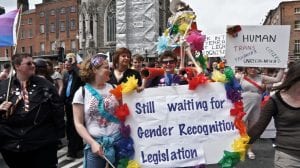Liam Davis is a law PhD student at the University of Bristol. He tweets as @LiamJamesDavis.
With diverse formally formations increasing, it is arguable that the birth registration system is not fit for purpose because it is tethered to ‘traditional’ understandings of family life and cannot adequately account for ‘modern’ families. This post considers mismatches between law and identity within birth registration for trans parents.
This post is inspired by my article, “Deconstructing tradition: Trans reproduction and the need to reform birth registration in England and Wales”, published in the International Journal of Transgender Health. A limited amount of free copies are available direct from the publisher, here. Otherwise, you can request an Open Access copy through my university profile/emailing me, or by tweeting me.
Background
You would be forgiven for thinking that the term “male mother” is an oxymoron, but this is the conclusion the Court of Appeal reached in R (McConnell) v The Registrar General for England and Wales [2020] EWCA Civ 559 regarding a trans man, Freddy McConnell, who gave birth and wanted to be registered as his child’s father (or parent) on the birth certificate. (more…)



